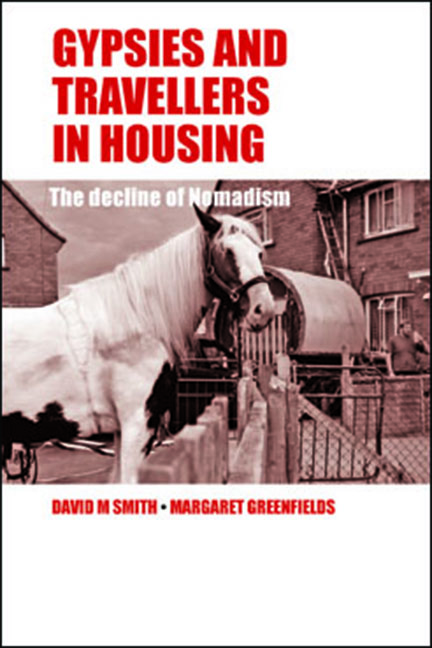Book contents
- Frontmatter
- Contents
- List of tables
- Acknowledgements
- Foreword
- one Introduction
- two Space, surveillance and modernity
- three Gypsies, nomads and urbanisation: a social history
- four The research sites and population sample
- five Routes into housing
- six Housing transitions
- seven Gypsies, Travellers and gorjers: conflict and cooperation
- eight Recreating community
- nine Young people in housing: aspirations, social relations and identity
- ten Conclusion
- Appendix A Methodologies
- Appendix B Glossary of words and terms
- References
- Index
two - Space, surveillance and modernity
Published online by Cambridge University Press: 03 February 2022
- Frontmatter
- Contents
- List of tables
- Acknowledgements
- Foreword
- one Introduction
- two Space, surveillance and modernity
- three Gypsies, nomads and urbanisation: a social history
- four The research sites and population sample
- five Routes into housing
- six Housing transitions
- seven Gypsies, Travellers and gorjers: conflict and cooperation
- eight Recreating community
- nine Young people in housing: aspirations, social relations and identity
- ten Conclusion
- Appendix A Methodologies
- Appendix B Glossary of words and terms
- References
- Index
Summary
In this and the following chapter, the empirical sections of the book will be situated in their broader theoretical, historical and contemporary contexts and an attempt will be made to tease out the interconnections between these dimensions. For example, historical and comparative studies show that racism and persecution have been constant features of the relationship between Gypsies, Travellers and the wider society, albeit the degree and virulence has varied at different periods according to wider social, political and economic conditions (Kenrick and Puxon, 1972; Fraser, 1995). However, the prejudice and marginalisation experienced by nomadic communities today, while displaying much historical continuity, is also related to factors specific to contemporary socioeconomic and political processes such as a general increase in inequality and polarisation of life chances as well as a growing social and political intolerance towards disadvantaged groups over the past three decades (McGhee, 2005). As Wacquant (2008) observes, these processes have unleashed massive ‘structural violence from above’ on large sections of the unskilled labour force in the ‘advanced’ economies of the western world, consigning many to economic redundancy and social marginality (2008, p 24). At the same time as traditional ‘blue collar’ jobs have been decimated through deindustrialisation and globalisation, so the (former) manual working classes have had to contend with large-scale immigration that is generally championed most vocally by those social groups who benefit directly or indirectly from a cheap and flexible immigrant labour force (Hanley, 2011). Consequently many immigrants are channelled into the same decaying and spatially segregated neighbourhoods as economically redundant sections of the native population. These marginalised segments of the native and immigrant populations are socially and spatially segregated from the rest of society, where ‘territorial stigma’ with its attendant class and ethnic dimensions is a reality of their daily lives. As Wacquant notes:
Any comparative sociology of the novel forms of urban poverty crystallizing in advanced societies at century's turn must begin with the powerful stigma attached to residence in the bounded and segregated spaces, the ‘neighbourhoods of exile’ to which the populations marginalized or condemned to redundancy by the post-Fordist reorganization of the economy and the post-Keynesian reconstruction of the welfare state are increasingly consigned. (Wacquant, 2008, p 169, italics in original)
- Type
- Chapter
- Information
- Gypsies and Travellers in HousingThe Decline of Nomadism, pp. 13 - 44Publisher: Bristol University PressPrint publication year: 2013



